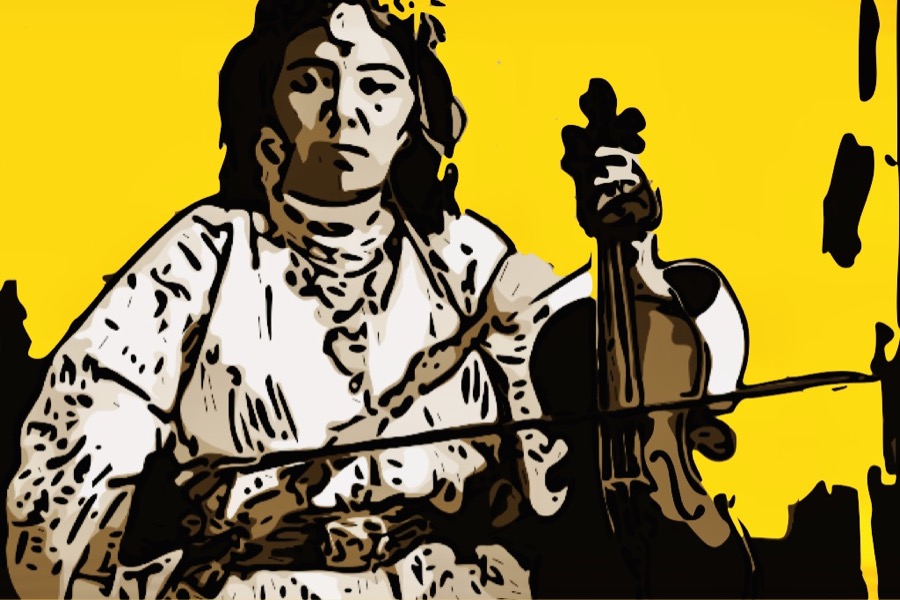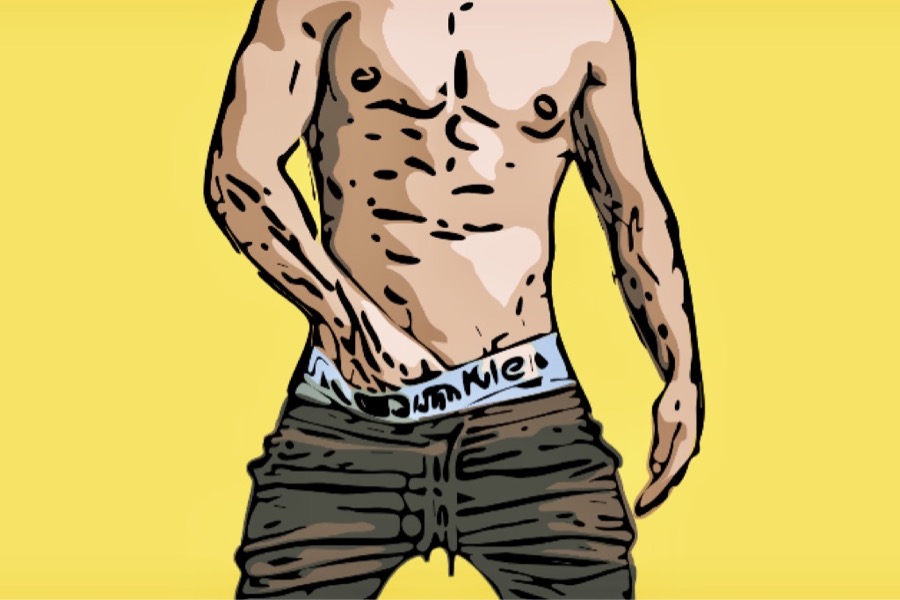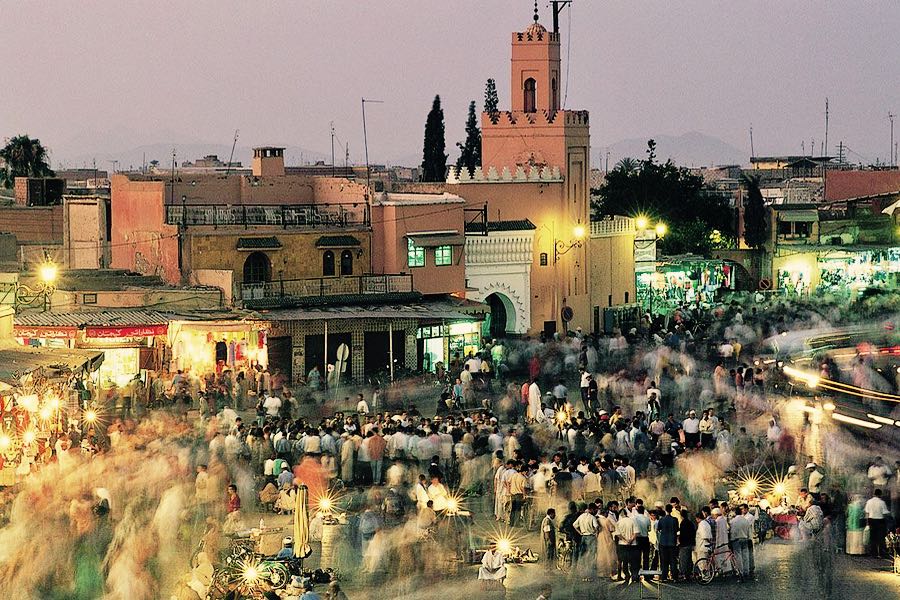I have often wondered how my grandparents loved: born in the early 1900s, grew up with very little and without needing too much rhetoric, with a handful of wheat, a total sense of gratitude to the earth, absolute freedom, immersed in the green hills of central Morocco, on the slopes of the great Atlas Mountains. They seemed to know what love was, what it looked like, and, above all, where to find it. Whether it was a band playing at a wedding or near a willow where a lover decided to stop grieving, or later in the evening in the blooming field, where a shepherd walked back home alone singing. They even used to quote poems of love and battles from the Moroccan folk tradition, by heart.
So many poems and stories were shared -so many were immediately forgotten- when I accompanied my grandmother to the public oven to bake the bread. She walked with extreme elegance, in her emerald green caftan, with the bread pan sitting on top of her head, supported by a wrapped white veil from which, with my total astonishment, fiery red hair peaked out. Conscious step, straight posture, fervent life. In her gestures, in her daily rituals, the salvation of my entire happiness and pride was accomplished. Look, everyone! She’s my grandmother! She’s my grandmother!
Little by little, when my eyes filled with wonder and pride felt full, I hopped to her and took her hand. My grandmother was always reciting poems: some about love -a little racy at times- some about sacrifice, some others about the debt flowers have with bees and men with the earth. Then the Koran stories. The flowers of the Koran. This was the path of my emotional education: from those early morning rituals to my shrilling voice echoing my grandmother’s songs.
Love songs
My grandmother is uneducated, she wouldn’t be able to write down anything she sings. Not a single word. But she never lacked words: her hands, her arms, her prominent forehead, her cheeks… covered with Berber tattoos. A mark -that equals a word- on one knuckle and another on the forehead, and so on. My grandmother is an endless song herself.
Grandma Fatna: I looked up, filled with joy, to look at her face and to the large wooden pan protecting my face and eyes from the powerful rays of the sun. I looked at her. I smiled. My happiness was safe. Poetry, poetry that looks at me.
I don’t memorize a verse, nor a song from that journey together, from those Aristotelian walks.
My hope will always be that an anthropologist will compile all these poems and stories because this is what Moroccan literature is made of: completely illiterate people devoted to loving, who seek each other with teary eyes. Not among history or literary criticism textbooks, but rather among a millet and wheat field. My heroes are there, watching the hornet visiting its rose.
Examples of this current are Mohamed Mrabet, Mohamed Choukri, and then her, the warrior-poet: Kharboucha. Although, what remains of Kharboucha is very little.

The first chikha
Since it’s not being subjected to any censorship and because it is transmitted only verbally, the poetry and music of the chikhas are one of the few sources documenting love and sexuality in Moroccans’ daily lives. There are numerous poems: from the most libertine to the most “chivalrous”. Unfortunately, the tradition has been lost, burying a rich heritage and a more or less accurate image of Moroccan love-life and the tolerance enjoyed by lovers. But who are the chikhas? They are dancers, poets, singers, they are free and emancipated women. The word “chikhas” can also mean prostitutes.
One of the first important characters of the oral tradition is certainly Kharboucha. A woman who dared, who sang about love, who denounced the corruption of politics, a woman of arms and music. Above all, for the Moroccan people, she will remain famous for her courage and her political intelligence.
I would have loved
To find someone
To write a letter to my beloved
Yet keeping my secret.
I would have loved to have been a letter.
Folded over, there
Inside my beloved’s suitcase
Kharboucha’s real name is Hadda Al-Ghita. Historians don’t know her exact date of birth, but they place it at the end of the second half of the 1800s. She had a short but intense life: a leader, an archenemy of the French colonists, and of the small Moroccan local governments. Kharboucha was an influential woman from the former Doukkala-Abda region. She used her voice and her poems to fight her enemies. She memorized the lyrics to mobilize the people of her native land: the Oulad Zayid tribe. Kharboucha, who could not read nor write, shaped the first history chapters of Aita, of the music genre, becoming both an iconic figure of this musical style and one of the first political activists of rural Morocco.
Around the same time, Aissa Ben Omar -who was the Caid (chief) of a nearby tribe- ordered the looting of Oulad Zayid, taking advantage of the period of political turmoil due to the death of Sultan Moulay Hassan I (1873-1894). It was in this context that Kharboucha decided to stand up against Aissa Ben Omar and encouraged her people to fight back.

The birth of aita
Writer Moha Ennaji, who has written extensively about Kharboucha, recalls that her political songs were the backbones of this music genre. According to him, the young woman: “invented a form of singing, known today as Aita. It was a call to action, sung exclusively by women or men dressed as women. […] These texts describe the life of women within their families, violence, anti-colonial resistance, a strong sense of independence, and an urgent desire for political rights“.
Unfortunately, chikhas today are considered ambiguous and controversial. These artists suffer from marginalization in a society where most people do not distinguish between the art of prostitution on the one hand and the art of entertainment, dance, singing, oral poetry on the other. A chikha is both an artist and a whore. Let’s not forget that chikhas and proud whores are the authors of a good part of Moroccan literature! Please note: I use the word whores with the highest and utter pride and respect, as the greatest French courtesan of the twentieth century, Griselidis Real, meant it. She was also a chikha, in some way.
The art of prostitution
Quoting Griselidis Real’s “Carnet de bal d’une courtisane”: “Prostitution is art, humanism, and science. I’ve said it, I repeat it, and I’ll say it and write it again, until my last breath, in French, English, German and, if necessary, also in Italian and Spanish. Today, with hindsight, I think of these thirty years of the profession (that of a Prostitute, or more elegantly of a Courtesan or Peripatetic) with infinite nostalgia and gratitude.
“The only authentic prostitution is that of great artists and perfectionists, who voluntarily practice this singular form of craftsmanship with intelligence, respect, imagination, heart, experience, for a sort of innate vocation: true professionals, aware of their own power and limits, who know how to put themselves in someone else shoes, discover expectations, anxieties, desires, and who know how to reveal themselves without repercussions.
“We are and we remain free. Free of our bodies, free of our spirits, free of our money earned by the sweat of our asses and our brains. Free as migratory birds dressed in sparkling colors, flying over the sad mud in which they would like to bury us at a great height.”
The death of Kharboucha
Kharboucha was captured by the Caid. The French were very satisfied with the event. The Caid imprisoned her in a house that was set on fire. Kharboucha entered that house singing, aware of the imminent death. Kharboucha has inspired generations of singers, prostitutes, dancers, free women, disobedient and in love. Our lady of flowers. The holy poet of whores, peasants, oppressed, lovers, women, artists, of the last in line.
My saint.
Anas Chariai
translation by Barbara Burgio
©2019 Il Grande Colibrì
images: elaboration from a Kharboucha’s picture (CC0) / from needpix (CC0) / from an Eugène-Alexis Girardet’s painting




